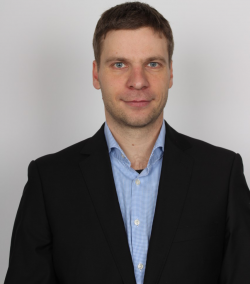


The Irving Institute is delighted to host Fulbright Scholar Filip Cernoch, Associate Professor in the Department of International Relations and European Studies at Masaryk University (Czech Republic), during the 2021-22 academic year. Dr. Cernoch will spend the year working on his research project, "The Ongoing Energy Transition: Lessons from the U.S. Coal Phase-Out." He will also teach ENVS 80.15: EU Energy Policy during the winter 2022 term.
We caught up with Dr. Cernoch recently to find out more about his work and what brought him to Dartmouth.
What was your path to the field of energy? What in particular interests you about this field?
In 2006, a gas crisis hit Europe as a result of disputes between Russia's Gazprom and Ukraine's Naftogaz [both state-owned energy corporations]. In the middle of winter, contracted gas stopped flowing to European customers for several days. At the time, I was finishing my master's degree in international relations and I realized how crucial the topic of energy was for the whole field. I started my PhD and, with my supervisor, we started to look more systematically at the problem, both in terms of research and teaching.
Gradually, an entire team dedicated to energy was created at Masaryk University. Initially, we focused primarily on energy security and geopolitics, but later we added environmental issues, climate, energy markets, and energy justice. We started two energy-related programs, collaborated with companies, and undertook many other activities. And I was fortunate to be involved in all of that.
What I personally find fascinating about this research field is the interconnection of typically political science topics with technical and economic issues. Whether it's building nuclear power plants, expanding renewables, disseminating electric cars, or dealing with gas supply problems, you always have to combine an understanding of the socio-cultural factors with an acceptance of the technical side of the issue.
Can you tell us a little bit about your current research?
I am working on the energy transition, the shift from traditional fossil fuels to low-carbon ones. I am primarily interested in the coal phase-out and how it is taking place, how it affects governments, companies, local communities, trade unions and Non-Governmental Organizations (NGOs). I am exploring how these actors influence the whole process and what the dynamic of the coal phase-out actually is. This is a crucial topic for the Central European region where I work. The Czech Republic, Poland, and Germany are all countries historically dependent on domestic coal production, so the planned coal phase-out will have major economic, social, cultural and political implications. The United States has already gone through a similar phase-out to a large extent. And while that experience is not transferable, an analysis of the situation in the US can help shed light on some of the challenges that await European countries ending coal.
Why did you choose Dartmouth to do your Fulbright?
The primary motivation was to participate in the activities of The Arthur L. Irving Institute for Energy & Society. It is an institution with great potential in the field I am involved in, and Professor Wilson is pointing it in a promising direction. Moreover, it has only recently been established, so it is more flexible and open to new ideas, activities, and people from outside, which is a great opportunity for a me as a visiting scholar. At the same time, the Institute operates at a top tier university with a plethora of interesting people, courses, activities. Personal reasons also played a role; my wife and I and our children wanted to go to a smaller university outside the big city, since we are huge outdoor enthusiasts. And New England is a beautiful part of the country.
Can you talk a bit about the class you'll be teaching at Dartmouth?
In Europe, energy issues are no longer dealt with by national governments; a significant part of the decision-making has shifted to the European Union institutions. This has had several interesting consequences. The European Commission, European Parliament, or other EU bodies are coming up with initiatives that would often be too radical or politically unacceptable for national governments. At the same time, this creates room for intense and often harsh diplomacy and negotiation between national governments and Brussels or between national governments.
Moreover, the entire European energy sector is moving towards decarbonization, towards an unprecedented reduction in greenhouse gas emissions, with the EU to be carbon neutral by 2050. This is creating enormous tensions between member states.
Within this broader framework, we will focus on three key issues in the course. Building a common energy market, decarbonizing energy production, and how the EU secures energy supplies from third countries, especially Russia. This should give Dartmouth students an overview of what the energy sector in Europe looks like and how it is legally, regulatorily, and financially managed — which can be useful in thinking about the US energy situation as well.
What are your first impressions of the College and the Upper Valley?
The Upper Valley is a completely different US than I expected and encountered on previous visits to Washington, Houston, or Tempe. Beautiful bucolic landscape, very friendly people, incredibly careful drivers, great sense of community. Of course, with the College, I expected a high level of professionalism and expertise, which was fulfilled. But I was pleasantly surprised by the relaxed and collegial attitude of the people I've met so far. And the campus is of course beautiful, I enjoy every opportunity to walk around it.